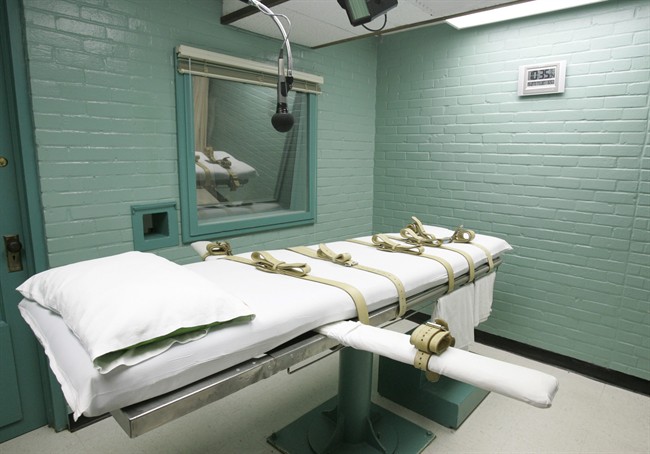JACKSON, Georgia – Corrections officials have postponed Georgia’s first execution of a woman in 70 years, citing problems with the lone drug that would be used for the lethal injection.

The only drug used in Georgia executions is pentobarbital.
Georgia Department of Corrections spokeswoman Gwendolyn Hogan said late Monday that the drug appeared cloudy so officials called a pharmacist and then out of an “abundance of caution” decided to postpone the execution. They did not give a new date.
The execution was first scheduled for 7 p.m. at the prison in Jackson. It was put on hold pending a U.S. Supreme Court ruling on a request for a stay filed by 46-year-old Kelly Renee Gissendaner’s lawyers. The court had still not ruled more than four hours later.
Kelly Renee Gissendaner, 46, was scheduled to die by injection of pentobarbital at 7 p.m. (0000 GMT) in the state prison for the February 1997 murder of her husband, Douglas Gissendaner.
READ MORE: States consider firing squads, gas chambers after botched injections
Previously, courts had found Gissendaner had plotted the stabbing death of her husband by her boyfriend, Gregory Owen, who will be up for parole in eight years after accepting a life sentence and testifying against her.
Gissendaner would be only the 16th American woman put to death since the U.S. Supreme Court allowed the death penalty to resume in 1976. About 1,400 men have been executed since then, according to the Death Penalty Information Center.
The Georgia Board of Pardons and Paroles, the only entity authorized to commute a death sentence, denied clemency last week and upheld that decision late Monday. The woman’s lawyers had recently urged the board to reconsider and “bestow mercy” by commuting her sentence to life in prison without parole.
READ MORE: Move to abolish Montana death penalty passes significant hurdle
Kelly and Douglas Gissendaner had a troubled relationship, repeatedly splitting up and getting back together, divorcing and remarrying. She was a 28-year-old mother of three children, 12, 7 and 5 years old. And she had an on-again, off-again lover in Owen.
In prison, Gissendaner eventually took responsibility: Rather than divorcing her husband again, she pushed Owen to kill him. Acting on her instructions, Owen ambushed her husband while she went out dancing with friends, and forced him to drive to a remote area. Then he marched him into the woods and stabbed him multiple times, prosecutors said.
Owen and Gissendaner then met up and set fire to the dead man’s car in an attempted coverup, and both initially denied involvement, but Owen eventually confessed and testified against his former girlfriend.
Her lawyers challenged the constitutionality of her sentence as disproportionate, given that she wasn’t there when Owen killed her husband, and yet Owen will eventually be eligible for parole. But Georgia’s Supreme Court voted 5-2 Monday to deny her motion, citing Owen’s testimony that she pushed for murder rather than divorce so that she could get her husband’s insurance money.
In their request Monday for reconsideration, Gissendaner’s lawyers said the parole board did not have a chance to hear the overwhelmingly positive testimony of many corrections employees who declined to speak up for fear of retaliation.
Her clemency petition already included testimonials from dozens of spiritual advisers, inmates and prison staff who described a seriously damaged woman transformed through faith behind bars. She has shown remorse and provided hope to struggling inmates while helping guards maintain control, they said.
“The spiritual transformation and depth of faith that Ms. Gissendaner demonstrates and practices is a deep and sincere expression of a personal relationship with God,” Prison chaplain Susan Bishop wrote. “It is not a superficial religious experience.”
Two of Gissendaner’s three children also asked the board to spare their mother’s life, describing their own emotional journey from anger and bitterness to forgiveness.



Comments